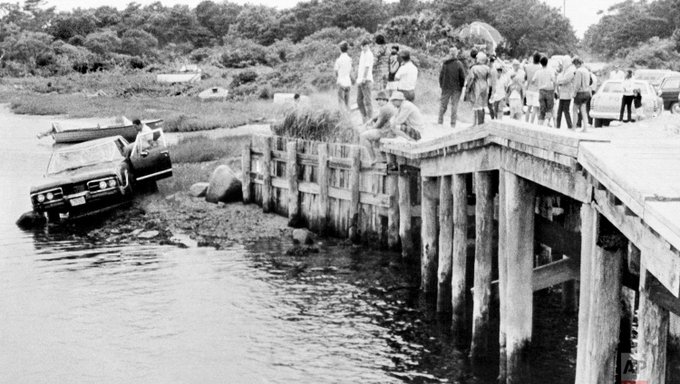AP Tweet On 50th Anniversary Of Chappaquiddick Met With Backlash, Fact-Checks
In commemoration of the 50th anniversary of the "Chappaquiddick crash," which resulted in the tragic death of Mary Jo Kapechne and an enduring "cover-up" scandal, the Associated Press posted a tweet Thursday. But critics quickly noted that the news agency left out some key details from its succinct summary of what happened that infamous night.
"50 years ago today, Sen. Edward M. Kennedy left a party on Chappaquiddick Island near Martha's Vineyard with Mary Jo Kopechne, 28; some time later, Kennedy's car went off a bridge into the water. Kennedy was able to escape, but Kopechne drowned," AP tweeted.
The passive language and the glaring omission of important details about the equally tragic and scandalous incident did not go unnoticed online.
"Surprisingly, AP fails to mention that Kennedy was driving drunk, that he left Mary Jo Kopechne to drown, did not call the police for help and didn't report the accident until the following day," one critic replied. "'The car went off the bridge' huh," another reader wrote, noting AP's choice to leave out that an intoxicated Kennedy was driving the vehicle.
"And the driver failed to call for help or do anything to report the event until he sobered up. Whether Mary Jo Kopechne could have been saved is speculation, but evidence showed she didn’t die immediately," another citizen fact-checker wrote.
Hot Air's Ed Morrissey points out that the news organization declaring that "Kopechne drowned" is also problematic. "It’s not true that Kopechne 'drowned,'" writes Morrissey. "The coroner never autopsied the body, itself a curious omission when dealing with an unattended death of a healthy young woman. Eyewitness testimony by the person who recovered her body at the scene, as well as the position of the body, strongly suggests she suffocated after spending a significant amount of time exhausting the oxygen in the air bubble of the submerged car."
While AP appears to be trying its best to whitewash what happened that night, Vanity Fair provides a more honest take, if leaning a little heavily on the gender angle: "Looking back 50 years on, Chappaquiddick says much about its era, a time when a privileged, powerful man could manipulate a system to avoid prosecution while a young woman who had ascended in male-dominated Washington—when only 11 women were in Congress—had both her life and death engulfed by the senator’s political ambitions and America’s fascination with the Kennedys."
One important detail left out by Vanity Fair in that passage: Kennedy's political affiliation.

